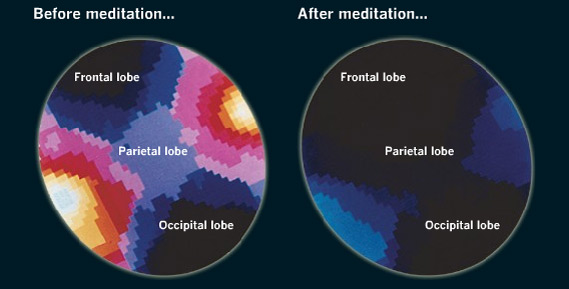 The brain reacts to and absorbs the stimuli it is presented. When for a period of time, we turn-off the input, reduce the stimuli and go into a meditative state, we give the brain a rest. The brain is always on whether we are actively engaged or mindlessly watching a movie.
The brain reacts to and absorbs the stimuli it is presented. When for a period of time, we turn-off the input, reduce the stimuli and go into a meditative state, we give the brain a rest. The brain is always on whether we are actively engaged or mindlessly watching a movie.
Quieting the mind through meditation is like consciously taking your thoughts on a luxury transportation ride in a stretch limo, relaxing by turning off brain activity but without losing touch with reality. It puts the meditator in a state of stillness where incitement from outside is met without attachment of thought. In the East, the birthplace of meditation, the end game is to reach a state of bliss referred to as Samadhi.
Neuroscientists have observed a variety of changes that take place within our most valuable organ when in the meditative state. Using MRIs and EEGs they watch gray matter expands. They see the brain on meditation as it also registers the reduction of activity in the “me” centers. Researchers are becoming more aware of the notable neurological benefits.
For millennium finding solace within has been practiced by thousands of people with the benefits of staying healthy, mentally, emotionally, spiritually and even physically. There are several advantages to using meditation to enhance brain health on all of these levels. There is evidence that meditation – quieting of brain activity helps relieve depression, anxiety and improves concentration and attention spans.
Curtailing Anxiety
Meditators have the ability to gain control over their thoughts more easily than non-meditators. With all the chaos that surrounds us in our day to day lives it’s easy to get caught up in the fray. At that point, if let to control us we can easily slip into the not so unfamiliar state of anxiety.
With controlled breathing, as part of the meditation practice, a practitioner can guide their sense of well-being back into a calmer state. Even actively engaged in a traffic hold-up or running late for an appointment the meditator can choose mind control quicker than the non-practitioner.
Slow Down Brain Aging
As we grow older we lose brain mass; it shrinks. We have conquered longer life expectancy, but it’s a fact that the brain starts to deteriorate after the second decade of life. Not a lovely thought for sure, but through neuroscanning, evidence has been provided by studies done at UCLA that clearly demonstrate that people who have meditated for an average of twenty years don’t lose as much gray matter volume as those who don’t practice meditation. Now that’s the best reason to take up meditation yet! Along with the other benefits you get to grow older with your wits about you.
Increase Brain Volume
It is true that as we grow older we lose brain mass, but what if we could actually increase brain volume? If we have more to begin with, we have a decided advantage. Having more brain mass as we go into our later years means we are less likely of losing competency. Research provided from a team of Harvard neuroscientists in 2011 found that regualr periods of mindfulness meditation can actually modify the cortical thickness of the hippocampus.
It adds to the outer density. Think of it like strengthening a muscle. In this case the ‘muscle’ is responsible for learning and memory. Volume is also found to be increased in certain areas of the brain that regulated emotions. The bonus is – there are decreases in the brain cell mass in area of the amygdala which is responsible for stress, fear and anxiety.
Leave your comments below. Do you know someone who has shown visible signs using meditation as a brain builder. Perhaps you have had a remarkable experience and would like to share? Leave a comment, it would be great to hear from you.